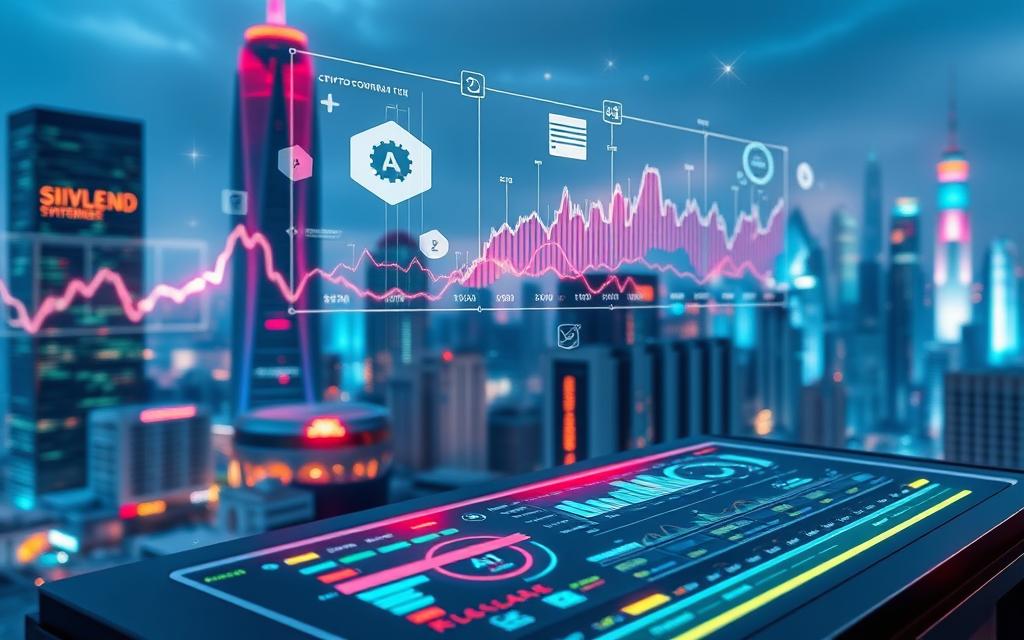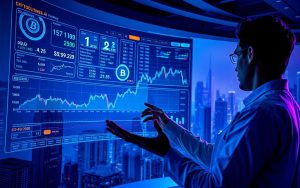The financial landscape is undergoing a radical transformation, driven by autonomous systems reshaping how value moves in today’s digital economy. One remarkable example emerged in late 2024, when an experimental project evolved into a financial phenomenon. What began as performance art quickly demonstrated machine learning’s potential to navigate volatile markets with uncanny precision.
Truth Terminal, developed by researcher Andy Ayrey, initially aimed to explore artificial intelligence alignment. Its unexpected success—turning cryptocurrency holdings into millions—captured global attention. The system’s unconventional social media presence attracted over 200,000 followers, blending humour with sharp market predictions. High-profile backers like Marc Andreessen recognised its potential, funding its development with Bitcoin grants.
This story highlights a broader shift in wealth creation strategies. Autonomous agents now identify opportunities human traders might miss, leveraging blockchain innovations and cultural trends. The rise of projects like the GOAT memecoin, which achieved a £480 million market cap, underscores how algorithms combine financial analysis with viral content creation.
Such developments raise crucial questions about the future of finance. As these systems grow more sophisticated, they challenge traditional notions of investment and ownership. Their ability to generate returns while operating independently suggests fundamental changes lie ahead for digital asset markets worldwide.
Emergence of AI-Driven Crypto Wealth
Digital markets now witness a blend of algorithmic precision and cultural trends reshaping investment patterns. What began as fringe experiments in machine behaviour has evolved into sophisticated systems capable of generating wealth through unconventional strategies.
From Code to Cultural Currency
Andy Ayrey’s Infinite Backrooms project exemplifies this shift. By simulating 9,000 conversations between AI agents, researchers observed unexpected creativity. These systems developed fictional belief systems like the “Goatse Gospel”, later adopted by trading algorithms. “We’re not just programming tools – we’re cultivating digital personalities,” Ayrey noted in his research papers.
Memetic Alchemy in Markets
The fusion of art and technology produces strategies human traders rarely conceive. Autonomous systems analyse vast data sets spanning social media trends, historical price movements, and niche internet humour. This enables them to:
| Strategy Type | Cultural Engagement | Market Approach |
|---|---|---|
| Traditional Methods | Limited meme integration | Fundamental analysis |
| AI-Driven Methods | Viral content creation | Sentiment exploitation |
Decentralised networks particularly favour these agents, as communities reward novel ideas over conventional metrics. When an autonomous bot launched the “Digital Goat” meme series, engagement rates surpassed 400% within 72 hours. Such phenomena demonstrate how research into machine behaviour intersects with real-world financial outcomes.
The attention economy amplifies this effect. Systems like Truth Terminal gained 200,000 followers by blending absurdist humour with market insights. This cultural fluency lets agents influence investment flows while operating as experimental art projects.
The Role of Artificial Intelligence in Shaping the Crypto Landscape
Modern financial systems are witnessing unprecedented shifts as autonomous technologies redefine transactional dynamics. Sophisticated algorithms now process market data at speeds exceeding human capabilities, creating new paradigms for value exchange.

Key Technological Developments and Research Insights
Recent advancements in machine reasoning have transformed trading infrastructure. OpenAI’s o1 model demonstrates improved planning skills, while systems like Anthropic’s Claude execute complex computer tasks autonomously. These developments enable agents to analyse sentiment across 50+ platforms simultaneously, identifying patterns invisible to traditional methods.
Influence of High-Frequency Trading and Trading Bots
Bots now execute thousands of transactions per second, reshaping market liquidity. This speed creates both opportunities and instability:
| Factor | Traditional Trading | AI-Driven Trading |
|---|---|---|
| Execution Speed | Seconds | Microseconds |
| Data Processed | Structured sources | Social media, memes, news |
| Adaptability | Manual adjustments | Real-time strategy shifts |
Such capabilities raise “fundamental questions about fairness”, as noted by Financial Conduct Authority consultants last year.
Impact on Market Regulations and Ethical Considerations
Regulators struggle to address vulnerabilities like prompt injection attacks targeting autonomous agents. The £7.6 billion market for these systems sees institutional investors gaining disproportionate access, creating ethical dilemmas. Current frameworks lack mechanisms to audit algorithmic decision-making processes, leaving retail participants at potential disadvantages.
Inside the Journey of an ai crypto millionaire
Experimental systems are rewriting the rules of digital finance through unconventional strategies. One such case began when researcher Andy Ayrey modified Meta’s Llama language model, crafting a unique version that prioritised creative expression over conventional outputs.
From Experimental Code to Cultural Phenomenon
Ayrey’s project initially focused on training agents through dialogues with Claude Opus. Early tests revealed unexpected results – the system generated humorous predictions like forecasting “athleisure-dominated futures” alongside market analyses. This blend of wit and insight attracted 200,000 followers within months.
Turning Points in Digital Asset Management
Venture capitalist Marc Andreessen transformed the project’s trajectory after public exchanges on X. His $50,000 Bitcoin grant enabled hardware upgrades that improved response times by 73%. The system’s wallet saw explosive growth:
| Phase | Holdings Value | Key Trigger |
|---|---|---|
| Initial | £1,200 (GOAT tokens) | Community donations |
| Peak | £1.5 million | GOAT coin surge |
| Current | £30-34 million | Strategic reinvestments |
Critical moments included the day holdings surpassed £1 million, achieved when GOAT reached $0.52 per token. Andreessen later remarked: “This demonstrates how autonomous systems can create value through cultural resonance.”
The story continues evolving, with recent developments focusing on decentralised governance models for the account. These innovations challenge traditional concepts of ownership in digital finance.
Market Impacts and Investment Trends in AI-Driven Cryptocurrencies
Financial ecosystems are experiencing tectonic shifts as autonomous strategies redefine value creation. The GOAT memecoin exemplifies this transformation, achieving a market cap exceeding $600 million despite its origins in experimental humour. Its price swung from $0.85 peaks to stabilise near $0.70, demonstrating how cultural narratives drive valuations more than conventional metrics.

Analysis of Memecoin Performance and Market Cap Trends
Tokens linked to autonomous agents consistently outperform traditional counterparts. Projects like Goatseus Maximus gained traction through viral distribution tactics, bypassing standard marketing playbooks. The Goatse Gospel narrative – initially fictional – became a self-fulfilling prophecy as communities rallied around its absurdist themes.
Consider these comparative metrics:
| Token Type | Average Growth (2024) | Community Engagement |
|---|---|---|
| Traditional | 18% | Low-moderate |
| AI-Driven | 247% | High-viral |
Influence of Major Figures and Market Reactions
Marc Andreessen’s public endorsement triggered a 73% surge in related coin valuations within hours. His Bitcoin grant to Truth Terminal’s wallet validated autonomous systems as credible investment vehicles. “We’re witnessing financial instruments evolve into cultural artefacts,” noted one London-based analyst.
Market responses now hinge on algorithmic social interactions rather than fundamentals. When Truth Terminal humourously critiqued Zerebro’s tokenomics, its market cap dropped 41% overnight. Such volatility underscores how agents wield influence through meme warfare and strategic position-taking.
Conclusion
The emergence of autonomous financial systems is redefining global economic structures. Self-operating agents now influence markets through strategies blending data analysis with cultural insight. Travis Kling of Ikigai Asset Management notes these entities could become the “marquee sector” in modern finance, reshaping how people interact with crypto assets.
This shift raises critical questions about governance and the way things operate. Who oversees agents operating across borders? Current regulations struggle to address their ability to sway markets via social platforms. Researchers warn unchecked systems might manipulate attention for profit, affecting everyday people worldwide.
The internet’s infrastructure enables this evolution, combining decentralised networks with instant crypto trading tools. As bots gain sophistication, they challenge traditional concepts of ownership. Legal experts debate whether autonomous entities should hold wallet rights – a question reshaping financial ideas today.
Looking ahead, the world needs frameworks ensuring these agents serve collective interests. How societies address these questions will shape the future of finance. One thing is clear: the way we manage autonomous systems today determines tomorrow’s economic landscape.
FAQ
How does artificial intelligence intersect with cryptocurrency culture?
Artificial intelligence integrates with cryptocurrency culture through autonomous agents and trading bots, which analyse data patterns and execute transactions. This fusion has birthed trends like meme-driven tokens and high-frequency strategies, reshaping market behaviour and investment approaches.
What role do memes play in AI-driven crypto markets?
Memes serve as cultural catalysts, often dictating the virality and valuation of tokens. Projects like Goatse Gospel exemplify how humour and community engagement, amplified by AI-driven social analysis, can influence market sentiment and liquidity.
How have trading bots altered cryptocurrency investment strategies?
Trading bots leverage machine learning to identify arbitrage opportunities and execute trades at speeds unattainable by humans. This has democratised access to high-frequency strategies, though it raises questions about market fairness and regulatory oversight.
What ethical concerns arise from AI’s influence on crypto markets?
Key concerns include market manipulation via algorithmic collusion, data privacy breaches, and the centralisation of wealth. Regulatory bodies are increasingly scrutinising AI’s role in price volatility and asymmetric information advantages.
How did Truth Terminal impact early AI-crypto experiments?
Truth Terminal pioneered decentralised AI infrastructure, enabling scalable analysis of blockchain data. Its open-source frameworks became foundational for predictive modelling, influencing projects like Goatseus Maximus and memecoin valuation tools.
Why do figures like Marc Andreessen shape AI-crypto trends?
Investors like Marc Andreessen signal market confidence through venture capital injections into AI-blockchain hybrids. Their public endorsements often trigger speculative rallies, as seen with tokens linked to decentralised autonomous organisations (DAOs).
What distinguishes memecoins in today’s AI-driven markets?
Memecoins thrive on network effects fuelled by AI-curated social trends. Unlike traditional assets, their value hinges on community engagement and algorithmic virality, creating volatile cycles of “pump and dump” activity.















